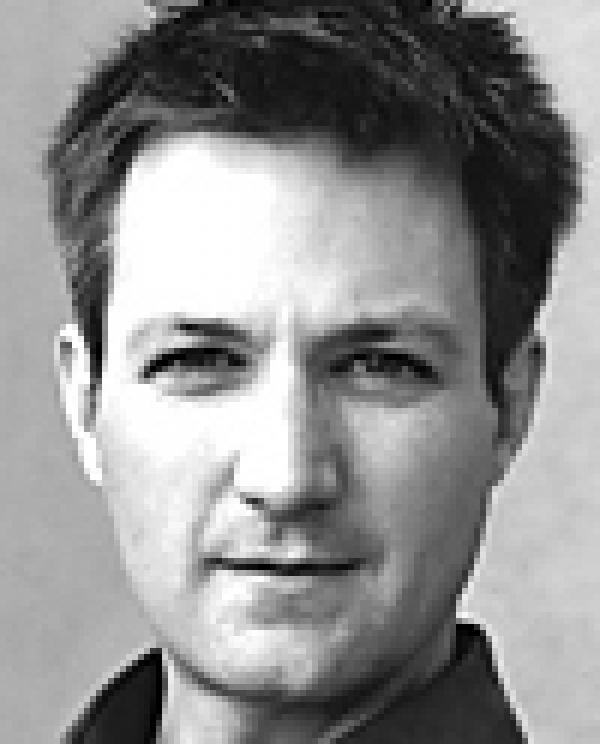Alexander Parsons

Bio
Alexander Parsons earned degrees from the Iowa Writers' Workshop and New Mexico State University. He now teaches fiction writing at the University of New Hampshire, an experience that can best be described as happy and arctic. He's published two novels, Leaving Disneyland (Thomas Dunne Books), which won the 2001 AWP Award for the Novel, and In the Shadows of the Sun (Nan A. Talese), which was a 2005 Barnes & Noble Discover Great New Writers selection.
Photo by Jack Parsons
Author's Statement
I still think that there's a more meritorious Alex Parsons out there who was robbed of his NEA grant when I got the call from Amy Stolls, despite her assurances that I hadn't been mistaken for a different applicant of the same name. That said, I'm grateful for his misfortune and the NEA's generosity. The fellowship has allowed me the time to work both as a repoman and writer in northern New Mexico. The result is - not surprisingly - comic: a novel in which various repomen pursue a mysterious lowrider bearing a hood mural by a famous painter. They also more generally compete against each other in a furious and free market economy underpinned by pit bulls and used cars. The period of the fellowship was a wonderful time artistically and has come to mark a cheerful departure from my previous work, which is characterized by a darker tone (witness the excerpt above).
From the novel In the Shadows of the Sun
They marched out of a sugarcane field and up a gradual incline. Some men, those most distant from the guards, had stripped lengths of the cane free and now gnawed on these. The view narrowed to a shaded tunnel, the foliage the translucent green of bottle glass beneath the sun. Ahead, the column of POWs vanished into bright space where the trees fell away. When Jack emerged from the overarching branches he was confronted by a vista of open flatlands backed to the north by the distant mountains of the Cordillera Central. The line of men disappeared entirely in the distance. The scale gave the marchers the appearance of immobility. A panoramic still-life of surrender. Jack couldn't imagine traversing such a distance. It was utterly demoralizing. He wondered if Miguel had felt anything, if the end was simply an end of light and sound and touch with no comprehension or awareness of the blade or bullet.
His head fell toward his chest. The macadam was tacky underfoot and threatened to strip the soles from his shoes. The heel of one boot had pulled free miles earlier, and now a pain in his hip pierced his exhaustion to the rhythm of his marching.
"-- darkness," Conrad said. "No earth. No sky. No Moon. No sun. Darkness everywhere." With each word a step, Conrad's story sounding like the efforts of a man learning to speak. "Then a thin disk. Like a coin. A yellow side. A white side. In this sits the Creator." He lapsed into Mescalero Apache. He had spoken steadily all day, and the dry whisper had come to irritate Jack, like the ceaseless chafing of a rough cloth. His own throat was so dry it hurt to speak. They had finished their water the night before, Conrad giving him the last of it. He remembered months earlier, when Conrad had taken Jack's dog tags from him. They had just shot and killed a Japanese sniper. The man dangled from the branch of the broadly fanned tamarind he'd roped himself to. Conrad ejected the cartridges from the soldier's bolt-action rifle. Gripping the barrel, he swung the Arisaka against the tree until part of the stock split free of the action. A clear sap welled from the scarred trunk.
"We ought to cut him down. Maybe bury him," Jack said, refusing to look up.
Conrad ran a thumb over the receiver of the mangled rifle, where a chrysanthemum was stamped into the metal. His hands and forearms were corded with muscle. He'd been a blacksmith. "Why?"
"I don't know," Jack said. "Seems moral, is all." He felt self-conscious saying this, and maybe he would not have suggested it had the sniper managed to hit any of them. It was early in the conflict: he had not yet seen men strung up by their thumbs, their guts spilled out, genitals stuffed in their mouths, eyes gouged out. He was only just learning how the killing and the death degraded a man.
Conrad stared at him. The hunger that had wasted Jack had only hardened the Indian, like leather left in the sun. He dropped the rifle. "That right?"
Jack nodded. He felt that this might be the case, but in truth it was the image of the man forgotten there, withering to bones that would clack like chimes until the rope frayed, that made him say it. He didn't want to shoulder the memory, or the thought it elicited: that a similar fate might await him.

